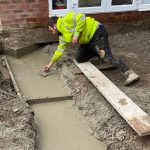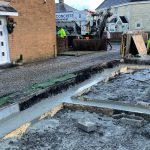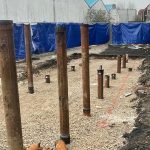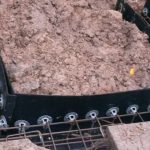Flood Proofing Your Foundations
Flood proofing your foundations
Aside from a fire burning your house down, probably the worst thing that can happen to a building is a problem with the foundations. The foundations are literally the skeleton of your home, supporting the life that exists above it so you want to ensure they are safe and secure at all times.
The recent weather may have got you questioning the state of your groundworks, particularly if your area has been subject to flooding or waterlogging. Your foundations are likely to be made of concrete and whilst this is pretty durable, one thing that can damage it is water. And no one wants to see their building washed away!
Ways water can damage your foundations
1) Concrete is prone to cracking as it is a brittle material and any size risks water ingress. This is due to shrinkage of the concrete over time, shifts in the ground such as subsidence (or wet ground – see point 3) and temperature stresses. Cracks mean paths for the water to seep in and are a breeding ground for mould!
2) If there are no cracks in the concrete (and hopefully there aren’t in your foundations!), water can still penetrate in the form of water vapour. The amount of rain which has been dumped recently means that the air is physically wet and that’s where the issues can start.
3) When the ground beneath the foundations becomes wet, it can swell which will make that which is above it (namely, your foundations) move. The wet ground also becomes looser and therefore less steady for the weight of a house to be relied upon. When the ground then dries out again, it will contract and the foundations will shift again.
What can you do about it?
So now we’ve given you the perils of what can happen if your foundations become waterlogged, it’s important to let you know there are things you can do to prevent it! These are:
Install and maintain proper drainage
Stopping the water from getting near the foundations in the first instance is probably one of the most effective ways of preventing water damage. You should try to have grounds sloping away from the foundations meaning the water will simply run off. You can also make sure you have the right drainage systems around the property so that when rain does fall (too much of a regular occurrence in this part of the country!), it will drain away from the structure. This starts at the top with guttering and making sure these are clear of debris and remain undamaged will ensure the water doesn’t go where you don’t want it to.
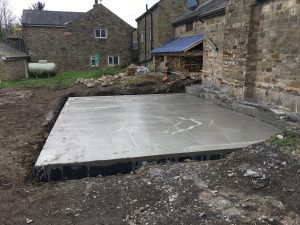
Treat your walls
Thanks to gravity, rain falls from the sky running downwards all the way to the ground and travels as deep as it can go. Water will penetrate most materials and your walls are no different. If these are properly waterproofed, this will reduce the amount of water which passes through them which will end up in your foundations.
Use waterproof concrete
Certain mixtures are available to add to the concrete in order to make it waterproof so these should be considered for your foundations. This is a cost-effective and relatively straightforward way of conducting a first stage of waterproofing the foundations themselves. There will be extra care required when placing the concrete but there isn’t the extra time required for a second stage of waterproofing. If this concrete becomes cracked or damaged in any way, there is the ability to fix it with grout injections but this can be difficult if the damaged area is inaccessible.
Install a waterproof membrane
Perhaps the most robust method of waterproofing concrete foundations is to apply a waterproof membrane before the concrete is even poured. This lines the foundations walls and has the ability to resist the hydrostatic forces that would force water into the material if it wasn’t in place. The membrane can actually compensate for issues beyond our control such as shifts in the ground causing cracks because it will remain bonded to the concrete. The strength of this bond will reduce the gravity (and therefore the cost) of any remedial work.
Being based in the North West and having over 100 years of construction industry experience, Basetec Piling are used to dealing with the type of weather we have had lately. We lay foundations that are appropriate for your project so if you want any more advice or would like to arrange a free site survey, please get in touch with us today. We’ll be happy to help!






